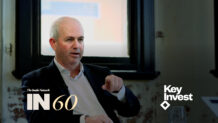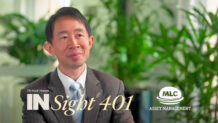Praemium CEO open for consolidation talks with an aim on growing scale
Praemium chief executive Anthony Wamsteker says the firm is still open to opportunities for consolidation after the investment platform provider rebuffed Netwealth’s infamous 2021 takeover offer.
That desire was evidenced earlier, when in mid-2020 Praemium took over long-time rival and partner platform Powerwrap in a blockbuster $56 million dollar deal, which Wamsteker calls a “wonderful” addition. “By and large the Powerwrap transition has been very smooth, but there’s further improvements to go,” Wamsteker tells The Inside Adviser.
“Praemium’s tools can be integrated into the Powerwrap adviser and investor portals. It’s been a highly successful addition because Praemium didn’t have quite the breadth and flexibility of Powerwrap. It’s good to have them both now.”
To obtain a larger market share, Wamsteker believes platforms need to maintain their edge through mergers and acquisitions. The offer from Netwealth, however, wasn’t to the CEO’s liking and, more importantly in his eyes, not in the best interests of Praemium shareholders.
Despite walking away, Wamsteker appeared open for talks but said it was more a question of scale rather than the benefits of having mass market share.
“There are two things that are going on that need to be explained. First there is this migration from the legacy platforms to the new challenger platforms taking place. It still has a while to play out and we want to take full advantage of that,” he explains.
“Praemium has about two per cent of the market in terms of market share when we combine Powerwrap and Praemium. When this migration ends Praemium will want to have secured double digit market share to remain profitable.”
To maintain an edge over other platforms, Wamsteker says scale is the most important factor.
“We think we’ve got this very good, niche high net-worth segment over the other platforms. But without double digit market share you don’t have scale. The bigger platforms see what you’re doing and with massive budgets they might catch up,” he says.
“So you want to get to double digit market share so that you’ve also got the investment capability to keep building out your platform and maintain that edge.”
New research from Investment Trends has confirmed that a shift in focus away from investment advice and towards intergenerational planning is well underway. Over half of Australian high net-worth investors are preferring to go it alone rather than seeking advice, which presents an opportunity to provide investors with a greater digital experience.
“The findings show there are real opportunities for advisers to deliver an advice service that provides the collaborative relationship that focuses on meeting the strategic needs of high-net-worth investors, particularly around the intergenerational transfer of wealth,” he says.
“HNW investors typically want to choose the advice they get and when they need it. What we find is about 60 per cent of the HNI are happy to get advice but as they need it. About 10 per cent that are happy to get advice and 30 per cent that don’t need it at all.”
Separate recent data from Investment Trends has indicated that overall adviser satisfaction with platforms had fallen, with the use of multiple platforms hitting a 10-year record amid calls for an integrated technology solutions platform.
“We must make sure our platform fits in whatever tools an adviser has, Wamsteker says. “This may include planning software that generates a statement of advice. So, we do have to blend in with whatever the adviser is working with.”
“But the idea of creating a one-stop shop will never work because the best platforms don’t have advice software embedded and the best advice software doesn’t have a platform offering.”
Wamsteker notes that it is unlikely that any one firm will have the whole answer for advisers, and more than likely advisers will continue to have a mix of different specialties they provide.
“We think it’s more likely that you must be extremely good at your APIs, and your interfaces and feeds with whatever tool an adviser may want. Young software developers and firms may emerge with some great product to help advisers, but they are specialists in a particular piece of software.”










